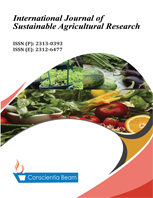Climate Variability, Incidences and Mitigation Strategies among Poultry Farmers in Abia State, Nigeria
DOI:
https://doi.org/10.18488/journal.70.2018.53.38.45Abstract
This paper investigated climate variability, incidences and mitigation strategies among poultry farmers in Abia State, Nigeria. It specifically analysed the trend of climate variables over the period of 30 years, the perception of poultry farmers as regards the impact of climate variability on poultry production in the study area, and examined the different mitigation strategies adopted by these farmers. A multi-stage sampling technique was employed in choosing the required sample of 120 poultry farmers. Data were collected with validated structured questionnaire, and analyzed using descriptive statistics. The result showed a high inter-annual variability in the volume of rainfall from 1983 to 2012 with insignificant correlation (0.0781) between rainfall volume and time. Also, the result showed reduction in number of rainy days and sunshine duration between 1983 and 2012 with correlation coefficients of 0.146 and 0.132respectively. Temperature had significant positive relationship with time with correlation coefficient 0.638.High mortality rate, disease outbreak, smallness of egg size, poor quality of egg shell, heat stress and reduced feed intake actually impacted on poultry production in the study area. Climate variability was therefore found to have affected poultry production in the study area and this has serious environmental and food policies implication. The respondents identified the use of climate resilient breeds, closeness to hatchery, feed improvement, mixed farming, use of artificial cooling system and stocking less during harsh season as major mitigation strategies to climate variability. It is therefore recommended that the government should come up with appropriate policy that will assist the poultry farmer to be more resilient and able to cope with effect of climate variability. Policies should also be formulated to reduce the emission and accumulation of green-house gases in our environment.

